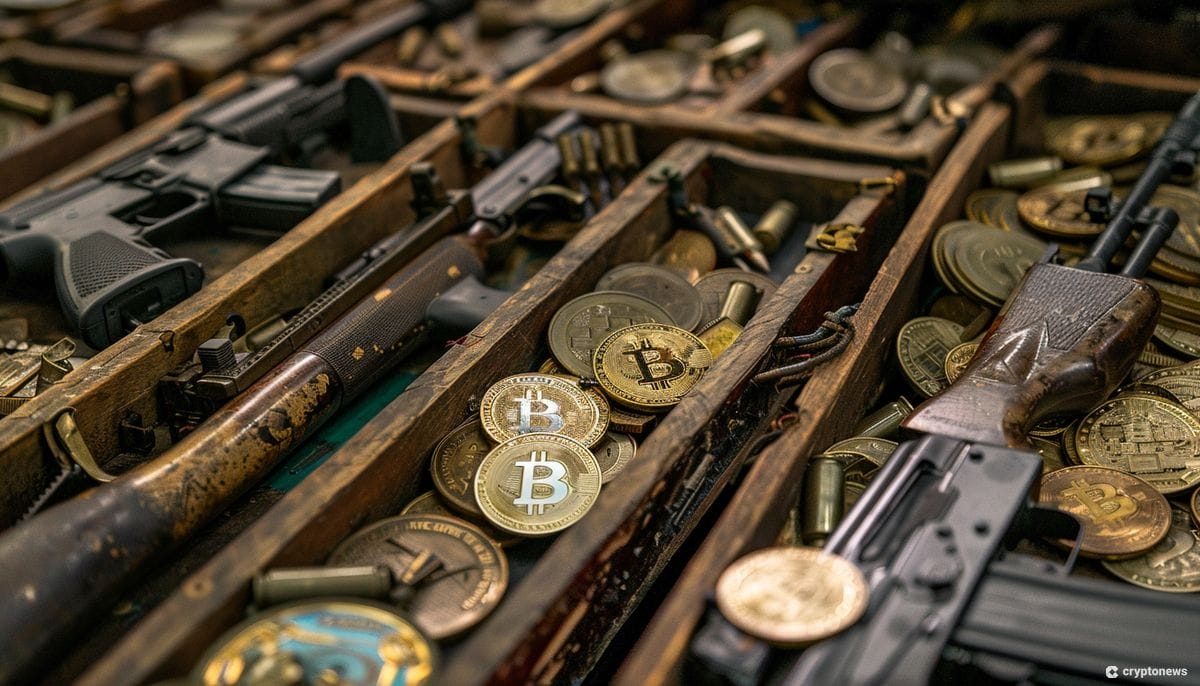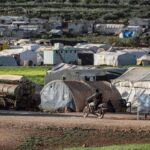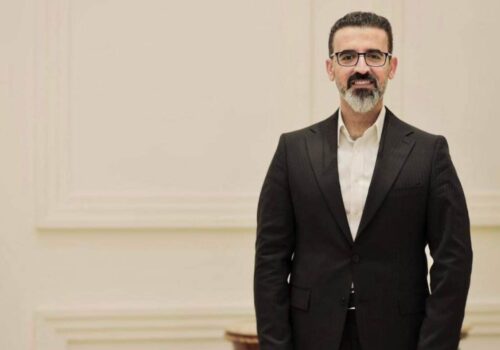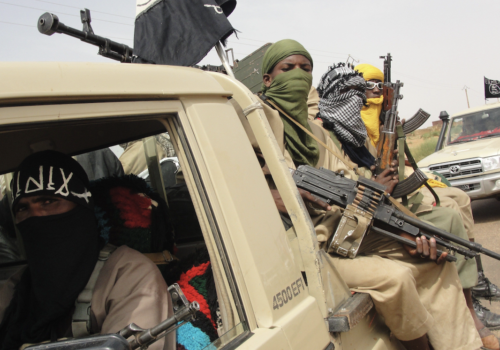In the operation against ISIS’s financial sources in Turkey, 11 suspects including some foreign trade companies and owners of foreign trade firms that manage the money traffic of the organisation were detained. 3 foreign nationals were arrested.
The operation was carried out by the Istanbul Provincial Security Directorate’s Intelligence Branch and Anti-Terrorism Directorate (TEM) teams in cooperation with institutions that monitor the Turkish banking/financial system and carry out financial criminal surveillance.
In the raids carried out at 27 addresses in Istanbul, 13 cryptocurrency cold wallets, 100 grams of gold, 130 kilograms of silver, 89 thousand 830 lira, 13 thousand euros, 17 thousand 907 dollars, 7 thousand 805 Saudi riyals, 770 UAE dirhams and 2 million 380 thousand Uzbekistan soms were seized.
Sources familiar with the issue said that although ISIS continues to operate the classic hawala system, intelligence information that the organisation has started to use the cryptocurrency market has gained certainty with the operations carried out in recent months.
Turkey’s operation against many money transfer intermediaries, companies and individuals who were found to be transferring money through the hawala system under the guise of foreign trade companies also targeted individuals who have been named in US sanctions in the past.
In 2022, Turkey had carried out an operation on a similar scale and froze the assets of several companies, including Granti Gold, Import and Export, run by Abdul Rahman Al-Rawi, a Turkish citizen of Syrian origin who financed ISIS and terrorism, as well as some Syrians, Turks and Afghans who transferred money in Turkey.
Syrian sources claimed that the latest operation in Istanbul targeted companies associated with the Al-Rawi network. According to Syrian sources, Abdelrahman Al-Ahmad and Muhammad Al Ahmad, who were arrested in Istanbul on charges of membership in ISIS and violating the Law on Prevention of Financing Terrorism, are associated with the al-Rawi network.
Al-Rawi network: ISIS finance body
Although Turkish authorities declined to comment on this issue, many Syrian sources claim to have precise information that the latest operation targeted companies associated with the Al-Rawi network. In this respect, the latest operation is not the first against the Al-Rawi network. Al-Rawi was subject to US sanctions in 2019 and accused of funnelling money to ISIS.
Syrian opposition security sources say that the al-Rawi network was restructured after Abdurrahman al-Rawi, whose companies were shut down and assets frozen by Turkey in 2022, and that Abdurrahma al-Rawi, who organised the network extensively in Turkey in the past, worked as a money transfer manager when ISIS controlled large areas in Iraq and Syria.
After the killing of his uncle Fawaz Al-Rawi, one of the emirs in charge of the ISIS’s economy, he assumed responsibility for the financial affairs of the organisation and the distribution of salaries to its members. Al-Rawi network allegedly fled to Turkey via Idlib after the defeat of ISIS.
After obtaining this information, the Turkish authorities issued a search warrant for Al-Rawi. His brother Osman was arrested. In mid-2020, Al-Rawi was arrested and later released. Syrian sources following the issue said that Al-Rawi family members have become the most financially influential people in the movement of ‘illegal’ money since 2021.
Turkish sources said Abdelrahman Al Ahmad, Hashim Ali Hussein and Taleb Ahmad were arrested on charges of financing terrorism. A security source familiar with the issue did not comment directly on the relationship of the arrested individuals with the al-Rawi network but stated that ISIS’s financial network renews itself by constantly changing names and locations in certain patterns: ‘This network is not static. There is a physical money previously distributed to various locations. They circulate it through hundreds of individuals and small companies. There is also a flow that is transferred untraceably with a cold wallet. ISIS’s financial network is constantly on the move.”
Wandering finance network: From Syria and Iraq to Turkey, Europe and Africa
While ISIS was losing territory and power, it used the hawala system to send money from Raqqa, Deir ez-Zor and other areas to the HTS-controlled area in Syria and to various cities in Iraq. This was done for the organisation to establish a mobile financial network and sustain itself.
In 2017, Syrian hawala office operators told the Financial Times that some $25 million was wired in a few months to the town of Sarmada in northern Idlib near the Turkish border.
Abu Tarek, who has been running a hawala office in Sarmada since 2015 and prefers to use a pseudonym for security reasons, told Acta Fabula: “There were huge amounts transferred to this region by ISIS at that time. I can verify more than that amount. However, most of this money did not stay here. Those who took the money usually took the money away. They were asking how they could send it to Turkey or Germany. I can say that the amount of money received in two years exceeded 40 million dollars. Some of it was sent to Turkey, a few million dollars went to Libya and Algeria. A significant amount was sent to Germany.”
Abu Saif, who ran a hawala office in the city of Binnish until 2020, told Acta Fabula, “ISIS members came here through the regime before the flow of this money. Before the Abu Duhur wars, the region was subject to a serious ISIS migration. They were transferring the money. They moved from Raqqa in 2017 and 2018. And 16 million dollars coming from Deir ez-Zor were distributed to these people, HTS was also getting its share from these hawalas,” he said.
And indeed, in the last months of 2017, ISIS had suddenly appeared hundreds of kilometres from Raqqa and Deir ez-Zor, northeast of Hama, where Syrian opposition fighters and jihadists were engaged in fierce clashes with Assad regime forces backed by Russia and Iran.
Although there are claims, according to HTS sources, the organisation’s financial operations in Idlib were prevented during the operations against ISIS. However, there is no strong mechanism in Idlib to monitor the hawala system, which is carried out through remittance offices or individuals.
The Ministry of Finance of the Syrian Interim Government in northern Aleppo said that all hawala offices in the region have been inspected but that they have made new arrangements to stop unregistered transfers. In the SIG region, some of the money transfers are carried out by Turkish PTT companies, while the traditional hawala system continues in small towns and cities.
At the end of 2018, raids were carried out on many companies and hawala offices of the Al-Rawi network operating under different names in Iraq. Iraqi officials said that several al-Rawi network companies spread across Ramadi, Beici, Erbil, Sulaymaniyah and Baghdad were identified, and their activities were terminated. Before their closing, these offices were exchanging money with Syria, Turkey, Lebanon and some African countries to be transferred to ISIS members.
Iraqi parliamentarians claimed that ISIS smuggled 400 million dollars out of Iraq during its defeat.
While it is the organisation’s most important financial network, dozens of companies and individuals outside the Al-Rawi network, or connected to it in some way, have continued to provide financial flows to its cells in northwest Syria after the defeat of ISIS. During the defeat, ISIS is believed to have transferred money to Turkey via Syrian opposition areas, to Africa via Lebanon and Iraq, and to Afghanistan, which it calls Khorasan province, via Australia and some Gulf countries.
Al-Fay network
In 2019, apart from the sanctions and investigations against the Al-Rawi network, Sahloul Money Exchange Company, Al-Sultan Money Transfer Company, Tawasul Company, Saksouk Company, Al-Khalidi Exchange, Al-Hebo Jewelry Company, Ismail and Ahmad Bayaltun were regionally listed as financiers of ISIS through Turkey. These companies and individuals were also placed on sanctions lists by Turkey.
A similar situation was happening in Iraq as in Turkey. Despite the various operations carried out on ISIS’s financial network in 2018, the organization somehow continued its financial structure within Iraq. The Iraqi al-Fay family seemed to have replaced the al-Rawis. In investigations in 2019 and 2020, the Iraqi al-Fay network was financing ISIS through their Turkey-based company Al-Fay Company. Al-Fay network and companies were added to the sanctions list in 2021.
ISIS continues to access its funds
However, ISIS’s network in Iraq was not just about al-Rawis. Iraqi parliamentarians claimed that ISIS smuggled 400 million dollars from Iraq through various means during the disintegration process. According to Iraqi security sources, ISIS was transferring the money it obtained to Syria, Lebanon, Türkiye and Africa. One of those who managed this process was Amer Salem Hamza. With Hamza’s confessions, 10 people were arrested in Erbil. In the seized documents, assets worth 280 million dollars were detected to be used in terrorist financing in many countries, especially Amman.
According to USA assesment of Februay “Despite suffering leadership losses, ISIS maintains organizational cohesion in Syria and Iraq and has access to significant funds, estimated between $10 million and $20 million, mostly held in cash and other liquid assets.”
In same assesment said that “ISIS-Khorasan serves as a regional hub, transferring hundreds of thousands of dollars to financial facilitators as well as providing personnel and weapons to support external operations.”
Digitalisation of finance flows
Speaking about the money flow of ISIS members, a source close to the organisation states that ISIS groups have established their own fake Western Union and Moneygram organisation, and that these offices provide completely unofficial money flow, although they appear officially on the signboard.
ISIS also uses the crypto exchange for money flow, and crypto money accounts are communicated in the magazines they transmit to their followers through the programmes they broadcast, he told. Apart from the open accounts shared by ISIS, ISIS enables followers and sympathisers to communicate online with intermediaries for money transfer. The money flow provided in this way is usually done through cryptocurrencies. The communication channels of the organisation openly share the amounts received from the followers and sympathisers they contact.






